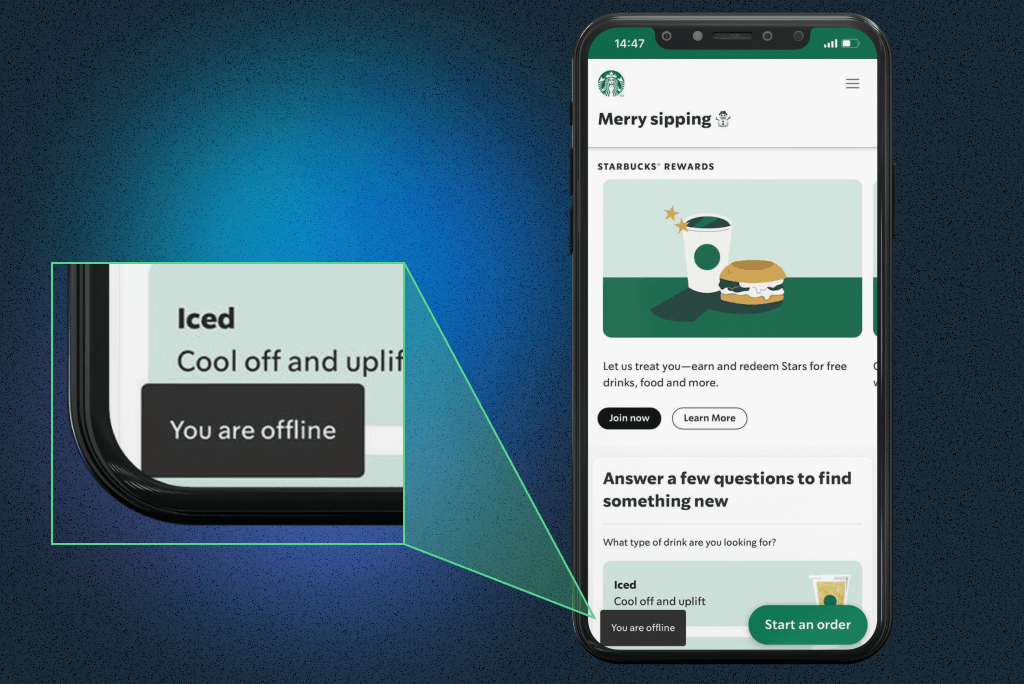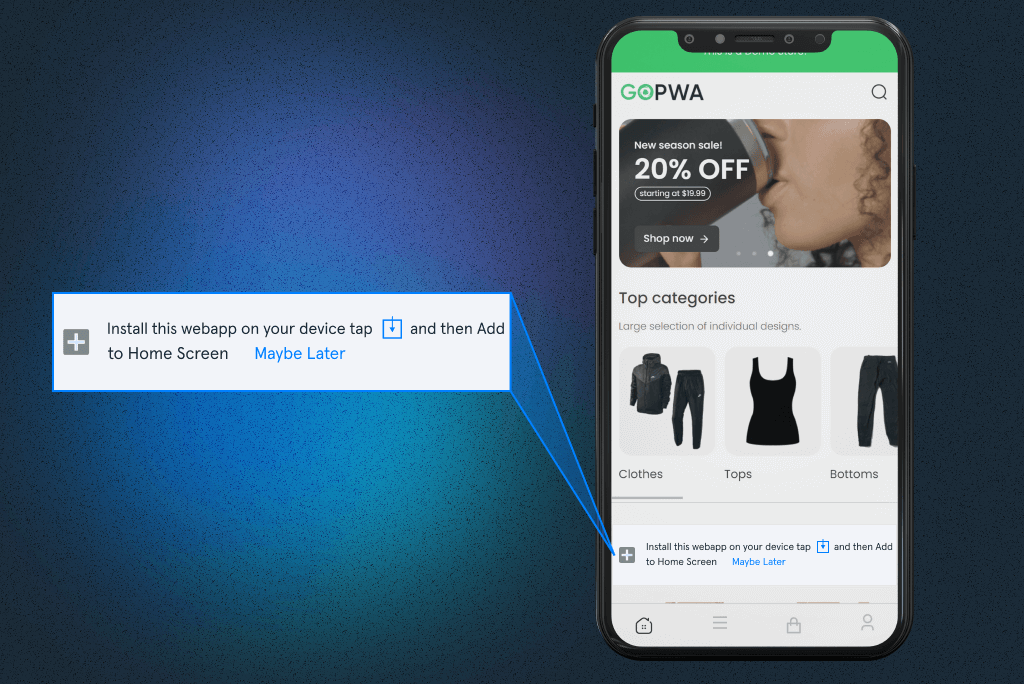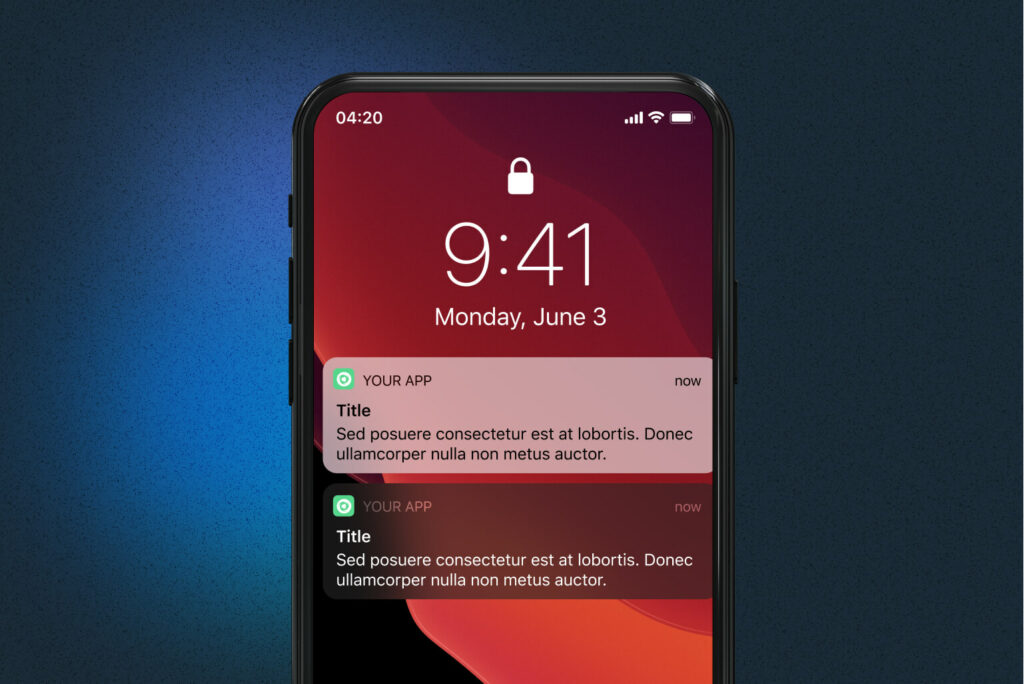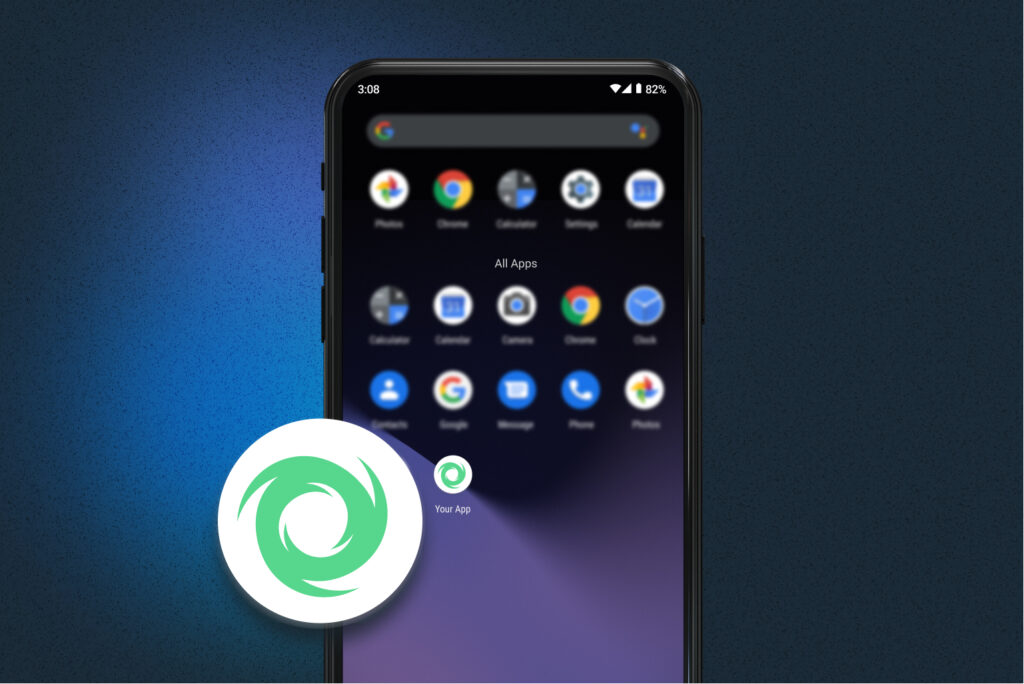How much money do you lose because of poor customer experience on mobile?
40% of customers who have a negative experience on a brand’s mobile website will go to its competitor.
You either provide a fantastic mobile shopping experience or lose a significant chunk of your revenue. Probably not even suspecting it.
As eCommerce businesses strive to improve user’ experience and boost conversions, Progressive Web Apps (PWAs) have emerged as a solution to the problem. By combining the web and native app experience, PWAs offer a range of features that can significantly enhance your online store’s performance.
We encourage you to explore the key features of progressive web apps and their advantages for eCommerce businesses to understand how a PWA can help you grab a part of the $488 billion market.
What is a Progressive Web App (PWA)?
If you already understand the PWA meaning, feel free to skip to the next section.
A Progressive Web App is a type of Web application that delivers an app-like experience to users across all devices. PWAs are built using web technologies such as HTML, CSS, and JavaScript, and they can run in any modern browser. They offer a seamless, responsive, and engaging user experience that can be accessed on various devices, regardless of their operating system.
Key Features of Progressive Web Apps
PWAs offer numerous features that make them particularly attractive for eCommerce businesses. In this section, we’ll dive into the most important progressive web apps features:
- Offline mode
- Add to home screen
- Push notifications
- App-like experience
- Fast loading and performance
- Discoverability
- Security and safety
- Easy updates and maintenance
You’ll also learn what the benefits of PWA mean for business owners and customers.
-
Offline mode
What happens when you’re browsing a website and the internet connection is suddenly lost?
You’re greeted with the ‘You’ve lost your internet connection’ message.
What happens after that?
Users close the tab, leaving the website without making the purchase.
With PWAs, this is not a problem. Thanks to service workers and caching solutions, progressive web applications can work offline or on low-quality networks. Whenever customers load a PWA, its content is cached and saved for a later visit. Customers can view the content offline and interact with it to a certain extent.
Value for customers:
- Uninterrupted browsing experience: Offline mode allows customers to continue browsing the eCommerce store and access previously viewed content even when there is no internet connection or in areas with poor connectivity. This ensures a seamless and reliable user experience.
- Faster load times: PWAs use caching strategies to store assets locally on the user’s device. This results in faster load times and improved performance, as the PWA does not need to fetch all resources from the server every time the user visits the site.
- Convenience: Offline access provides convenience to users who may want to browse products or review their shopping cart while commuting or in areas with limited internet access. This can lead to increased user satisfaction and engagement.
- Reduced data usage: Offline mode can help users save on mobile data consumption, as the PWA only needs to fetch new or updated content when connected to the internet. This is particularly beneficial for users with limited data plans or in regions with expensive data costs.
Value for businesses:
- Increased user engagement: The ability to provide a consistent and reliable user experience, even in offline mode, can result in increased user engagement and longer browsing sessions, ultimately driving higher conversion rates.
- Improved customer retention: By offering a seamless offline experience, you demonstrate that your eCommerce store is always accessible and reliable, which can foster customer loyalty and encourage repeat business.
- Competitive advantage: As not all eCommerce businesses have adopted PWAs or offer offline functionality, providing this feature can set your store apart from competitors and position your business as innovative and forward-thinking.
- Enhanced brand reputation: Providing an exceptional offline experience shows that you care about your customers’ needs and are committed to delivering a top-notch user experience. This can help build trust and credibility for your brand.
When implementing this feature of progressive web applications, remember that customers might not see the updated prices of products offline. It can lead to customer frustration and lost sales. Thus, if you update prices in your store regularly, you should turn this PWA feature off.
-
Add to Home Screen
The Add to Home Screen (A2HS) feature puts your online store just a tap from customers. It allows users to add a PWA to their device’s home screen, just like a native app. Next time customers want to visit your store, all they need to do is tap its logo. With 75% of people shopping at least once a month, A2HS increases the chances they’ll come back to your store.
Value for customers
- Easy access: Having the PWA installed on their home screen allows users to quickly and conveniently access the eCommerce store with a single tap, similar to a native app. This encourages more frequent usage and engagement with the store.
- App-like experience: The A2HS feature provides an app-like experience, with full-screen mode and no browser UI elements, offering a more immersive and enjoyable browsing experience for users.
- Faster loading times: Once installed on the home screen, the PWA typically loads faster than accessing a website through a browser, thanks to caching and other performance optimizations. This results in a smoother user experience and reduced waiting times.
- No need for app store downloads: The A2HS feature eliminates the need to search for, download, and install an app through an app store, simplifying the process and saving time for the user.
Value for businesses
- Increased user engagement: The ease of access provided by the A2HS feature encourages users to interact more frequently with the eCommerce store, leading to increased engagement, higher conversion rates, and potentially more sales.
- Enhanced brand visibility: Having your PWA installed on users’ home screens increases brand visibility and awareness, as users are more likely to remember and interact with your store.
- Lower development and maintenance costs: PWAs are generally cheaper to develop and maintain compared to native apps, as they are built using standard web technologies and do not require separate codebases for different platforms. The A2HS feature allows businesses to offer an app-like experience without the added costs of native app development.
- Bypassing app store restrictions: With the A2HS feature, businesses can avoid app store restrictions, fees, and approval processes. This provides more control over the distribution and updates of the PWA, ensuring that customers always have access to the latest features and improvements.
- Improved customer retention: The convenience and app-like experience provided by the A2HS feature can help foster customer loyalty, increasing the likelihood of repeat business and long-term customer relationships.
Still, many users are not familiar with the A2HS feature and may ignore the prompt to install the PWA on their smartphones. That’s why you may need to educate them first on the benefits of this PWA feature and then offer them to add your PWA to their home screen.
In conclusion, the Add to Home Screen feature of progressive web apps provides a superior browsing experience and strengthens your brand’s presence on users’ devices.
-
Push notifications
PWAs support push notifications, allowing you to send targeted and timely messages to your customers. This feature of progressive web applications helps you re-engage with customers, inform them about special offers or promotions, remind them about abandoned shopping cats, and keep them updated on their order status, improving customer satisfaction and driving repeat business.
Value for customers
- Timely updates: Push notifications deliver timely and relevant updates, such as order status, shipping information, or product availability. This helps customers stay informed and engaged with your eCommerce store.
- Personalized content: Push notifications can be tailored to individual users based on their preferences, browsing history, or past purchases, providing a more personalized and relevant experience.
- Convenient reminders: Notifications can serve as helpful reminders for customers about abandoned shopping carts, wishlisted items, or upcoming sales and promotions, encouraging them to complete their purchases or explore new deals.
- Opt-in control: Customers have control over the push notifications they receive, as they can opt-in or opt-out at any time. This gives them the flexibility to choose the type and frequency of updates that best suit their preferences.
Value for businesses
- Increased user engagement: Push notifications can drive user engagement by encouraging customers to revisit your eCommerce store, explore new products, or complete their purchases.
- Targeted marketing: Notifications allow you to send targeted messages to specific user segments based on factors such as location, demographics, or past behavior. This can help you run more effective marketing campaigns that resonate with your audience.
- Improved customer retention: By providing timely updates and personalized content, push notifications can help foster customer loyalty and increase the likelihood of repeat business.
- Higher conversion rates: Well-timed and relevant push notifications can nudge customers to take action, such as completing a purchase or taking advantage of a limited-time offer, leading to higher conversion rates and increased sales.
- Real-time analytics: Push notifications provide valuable real-time analytics and insights into user behavior, engagement, and conversion rates. This data can help you refine your marketing strategies and optimize your PWA’s performance.
In summary, PWA push notifications offer a range of benefits for both businesses and customers, creating a more personalized and experience. However, when overused, push notifications can harm user experience. That’s why you need to follow the best practices when using push notifications.
-
App-Like Experience
PWAs mimic native app experiences with features like app icons, splash screens, and full-screen mode. They can be added to the user’s home screen, providing easy access and a familiar interface. This app-like experience contributes to higher user engagement and retention.
Value for customers
- Seamless navigation: PWAs provide smooth and intuitive navigation, similar to native apps. This enhances the overall browsing experience for customers, making it more enjoyable and efficient.
- Consistent user interface: The app-like interface of PWAs ensures a consistent user experience across various devices and screen sizes. This consistency makes it easier for customers to navigate and interact with the eCommerce store.
- Improved performance: PWAs are optimized for speed and performance, providing faster load times and reduced latency compared to traditional websites. This results in a more responsive and satisfying user experience.
- Familiarity: The app-like experience of PWAs can make customers feel more comfortable and familiar with the platform, increasing their likelihood to engage with the eCommerce store and complete transactions.
Value for business
- Increased user engagement: The app-like experience of PWAs encourages users to spend more time browsing the eCommerce store, leading to increased engagement, higher conversion rates, and potentially more sales.
- Higher customer retention: By providing a smooth and enjoyable user experience, PWAs can help foster customer loyalty and encourage repeat business, ultimately improving customer lifetime value.
- Competitive advantage: Offering an app-like experience can set your eCommerce store apart from competitors, positioning your business as innovative and forward-thinking. This can help attract and retain customers in an increasingly competitive market.
- Cost-effective development: PWAs are generally cheaper and quicker to develop compared to native apps, as they are built using standard web technologies and do not require separate codebases for different platforms. This allows businesses to offer an app-like experience without the added costs and complexity of native app development.
- Simplified maintenance and updates: Maintaining and updating a PWA is easier than managing native apps, as updates can be rolled out quickly and seamlessly without requiring users to download and install new versions. This ensures that customers always have access to the latest features and improvements.
-
Fast Loading and Performance
PWAs are designed to be fast and efficient, utilizing Service Workers. They ensure that a PWA loads quickly and provides a smooth browsing experience, which can lead to increased user engagement and higher conversion rates.
Value for customers
- Enhanced user experience: Fast loading times and smooth performance contribute to a satisfying and enjoyable browsing experience, making it more likely for customers to engage with the eCommerce store and complete transactions.
- Reduced waiting times: PWAs minimize the time customers spend waiting for content to load, leading to a more efficient and seamless browsing experience.
- Better performance in low-connectivity areas: PWAs are designed to work well even in areas with poor internet connectivity or on slower networks. This ensures a consistent and reliable user experience, regardless of connection quality.
- Lower data usage: Due to efficient caching and optimized performance, PWAs consume less data than traditional websites, benefiting users with limited data plans or in regions with expensive data costs.
Value for businesses
- Increased user engagement: Fast loading times and optimized performance can lead to higher user engagement, as customers are more likely to spend time browsing the eCommerce store and exploring products or services.
- Higher conversion rates: A smooth and efficient user experience can result in higher conversion rates, as customers are more likely to complete transactions when they can easily navigate and interact with the site.
- Improved customer retention: By providing a consistently fast and enjoyable user experience, PWAs can help foster customer loyalty and encourage repeat business.
- Enhanced search engine rankings: Search engines, such as Google, consider page load speed and performance as ranking factors. PWAs can improve your site’s search engine rankings, increasing visibility and driving more organic traffic to your eCommerce store.
- Cost-effective development and maintenance: PWAs are generally more cost-effective to develop and maintain compared to native apps, as they are built using standard web technologies and do not require separate codebases for different platforms. The performance improvements offered by PWAs can lead to better business outcomes without the added costs of native app development.
By prioritizing speed and performance in your eCommerce PWA, you can create a smooth browsing experience and drive growth for your business.
-
Discoverability
PWAs are designed with search engine optimization (SEO) in mind. They are indexable and crawlable by search engines, which can lead to better visibility and higher search rankings. By following SEO best practices, you can improve the discoverability of your PWA and attract more organic traffic to your eCommerce store. You don’t have to pass all their requirements, as there is no need to publish your PWA in an app store (but you still can).
Value for customers
- Easy discoverability: PWAs are built using standard web technologies, which makes it easier for search engines to crawl, index, and rank their content. This means that customers can easily find and access your eCommerce store through search engine results.
- Accurate search results: SEO-friendly PWAs provide search engines with accurate and relevant information about your eCommerce store’s content. This ensures that customers find the information they are looking for quickly and efficiently when searching online.
- Improved user experience: By making it easier for customers to find your eCommerce store and its content, you can create a more seamless and enjoyable user experience, ultimately leading to higher engagement and satisfaction.
Value for Businesses
- Increased visibility: An SEO-friendly PWA can help improve your eCommerce store’s search engine rankings, making it more visible to potential customers and driving organic traffic to your site.
- Higher organic traffic: As your PWA ranks higher in search engine results, you can attract more organic traffic, which often has a higher conversion rate compared to paid traffic sources.
- Cost-effective marketing: By optimizing your PWA for search engine discoverability, you can reduce your reliance on paid marketing campaigns and focus on driving organic growth through search engine optimization (SEO) efforts.
- Competitive advantage: Ensuring that your PWA is SEO-friendly can give you an edge over competitors who may not prioritize search engine optimization, helping you capture a larger share of the market.
- Enhanced brand reputation: A highly discoverable and accessible eCommerce store can help build trust and credibility for your brand, as customers are more likely to associate your business with quality and relevance.
The SEO-friendly and discoverable nature of PWAs offers significant benefits for both customers and businesses, including easy discoverability, increased visibility, higher organic traffic, and cost-effective marketing.
-
Security & Safety
Customer trust is another thing that can take years to build and seconds to lose as a result of a data breach or theft. Security is one of the features of progressive web apps.
PWAs are served over HTTPS, ensuring that all data exchanged between the user and your eCommerce store is encrypted and secure. This enhanced security not only protects your customers’ sensitive information but also helps build trust and credibility for your brand.
Value for customers
- Data protection: PWAs use HTTPS, ensuring that all data exchanged between the user’s device and the server is encrypted. This helps protect sensitive information, such as payment details and personal information, from potential security threats.
- Increased trust: When customers know that their personal information and transactions are secure, they are more likely to trust and engage with the eCommerce store. A secure PWA can help build customer confidence and encourage repeat business.
- Safer browsing experience: PWAs minimize the risk of security vulnerabilities, such as cross-site scripting and man-in-the-middle attacks, providing a safer browsing experience for customers.
Value for businesses
- Enhanced brand reputation: By prioritizing security and providing a safe browsing experience, businesses can build a strong reputation for trustworthiness and credibility, ultimately attracting and retaining more customers.
- Reduced risk of security breaches: A secure PWA can help protect your eCommerce store from security threats, minimizing the risk of data breaches and the potential financial and reputational damage associated with them.
- Compliance with regulations: Ensuring that your PWA is secure and safe can help your business comply with data protection regulations, such as the General Data Protection Regulation (GDPR) and the California Consumer Privacy Act (CCPA), which require businesses to protect user information.
- Improved customer retention: By providing a secure and safe browsing experience, businesses can foster customer loyalty and encourage repeat business, leading to higher customer lifetime value and long-term success.
- Increased conversion rates: Customers are more likely to complete transactions when they feel that their personal information and payment details are secure. A secure PWA can help improve conversion rates and drive sales.
The secure nature of PWAs offers significant benefits for both customers and businesses.
-
Easy Updates & Maintenance
Updating and maintaining a PWA is relatively easy compared to native apps. Since PWAs are built using standard web technologies, updates can be rolled out quickly and seamlessly, without requiring users to download and install new versions. This simplifies the maintenance process and ensures that your customers always have access to the latest features and improvements.
Value for customers
- Access to the latest features: Easy updates and maintenance allow customers to enjoy the latest features, improvements, and bug fixes without having to manually update their app, ensuring a seamless and enjoyable browsing experience.
- No need for manual updates: Unlike native apps, PWAs update automatically whenever users access the app, eliminating the need for manual downloads and installations, which can be time-consuming and inconvenient.
- Consistent user experience: Regular updates and maintenance ensure that customers have a consistent and reliable user experience, regardless of when they last visited the eCommerce store.
Value for businesses
- Reduced development time and costs: Easy updates and mean maintenance businesses can deploy new features and improvements more quickly without creating and distributing separate updates for different platforms. This can save both time and resources.
- Increased user engagement: By providing customers with access to the latest features and improvements, businesses can encourage users to engage more frequently with the eCommerce store, leading to higher conversion rates and increased sales.
- Simplified maintenance: Regular updates and maintenance can help identify and fix potential issues before they become critical, ensuring the smooth operation of the PWA and minimizing downtime.
- Enhanced customer satisfaction: By ensuring that customers have a seamless and up-to-date browsing experience, businesses can improve overall customer satisfaction and encourage repeat business.
- Better adaptability: Easy updates and maintenance enable businesses to respond more quickly to changing market conditions or customer preferences, allowing for more agile and adaptive strategies.
As you need to support a single code base, you save a lot of money on development. Users don’t need to download updates, so they get the latest version of your eCommerce store every time they visit it.
PWA Development With GoMage
Taking into account all the features and advantages of PWAs, it comes as no surprise that eCommerce businesses’ affinity for PWAs continues to expand.
Our team of PWA experts is ready to help you build a PWA with maximum ROI.
GoPWA Storefront enables businesses to create fast, secure, and feature-rich PWAs for their eCommerce stores. Built with a strong focus on performance and user experience, GoPWA leverages cutting-edge technologies and best practices in PWA development to deliver a top-notch browsing experience for customers.
GoPWA is the fastest way to build a Magento PWA, as it’s built on Magento PWA Studio. In addition to features of PWA Studio, we’ve added dozens of unique features and over 45 integrations with a one-click installation process.
GoPWA speeds up the development process, reduces the time needed for development, and offers high speed out of the box.
“We have invested over 15,000 hours in developing our solution, ensuring that your clients won’t have to. This significantly reduces costs and saves at least 50% or more on PWA development.”, Roman Tsehynka, Head of PWA Engineering at GoMage
Progressive Web Apps Features: Key Takeaways
Progressive Web Apps offer a powerful solution for eCommerce businesses looking to enhance their online presence, improve user experience, and drive sales. With their unique combination of web and native app features, PWAs can revolutionize your digital strategy and help your business thrive in an increasingly competitive market. By understanding the key features of PWAs and how they can benefit your eCommerce store, you can make an informed decision about whether a PWA is the right choice for your business. So, why wait? Explore the potential of Progressive Web Apps and unlock new opportunities for your eCommerce store today.











